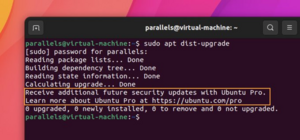Canonical: Difference between revisions
Created page with "'''Canonical''' is software company best known for creating Ubuntu. It is largely funded by South African billionaire Mark Shuttleworth. == Upstreaming == Alongside Red Hat and Google, Canonical makes up a substantial portion of upstream security patches in the Linux ecosystem. They maintain AppArmor<ref>https://apparmor.net/</ref>, a Linux security system that proactively manages threats, Snap<ref>https://snapcraft.io/</ref>, a Linux..." |
Ubuntu is based on Linux. |
||
| (8 intermediate revisions by 5 users not shown) | |||
| Line 1: | Line 1: | ||
{{InfoboxCompany | |||
| Name = Canonical Ltd. | |||
| Type = Private company limited by shares | |||
| Founded = 2004 | |||
| Industry = Computer Software | |||
| Official Website = https://www.canonical.com/ | |||
| Logo = Canonical logo 2023.svg | |||
}} | |||
[[wikipedia:Canonical_(company)|'''Canonical''']] is a software company best known for creating Ubuntu, an Operating system based on Linux. It is largely funded by South African billionaire Mark Shuttleworth. | |||
==Upstreaming== | |||
== | Alongside Red Hat and Google, Canonical makes up a substantial portion of upstream security patches in the Linux ecosystem. They maintain AppArmor,<ref>{{Cite web |title=AppArmor |url=https://apparmor.net/ |url-status=live |access-date=16 Mar 2025 |website=[[AppArmor]]}}</ref> a Linux security system that proactively manages threats, Snap,<ref>{{Cite web |title=The app store for Linux |url=https://snapcraft.io/ |url-status=live |access-date=16 Mar 2025 |website=[[Snapcraft]]}}</ref> a Linux appstore with sandbox support, and Livepatch,<ref>{{Cite web |title=Livepatch |url=https://docs.kernel.org/livepatch/livepatch.html |url-status=live |access-date=16 Mar 2025 |website=[[Livepatch]]}}</ref> a system to patch the Linux kernel without needing to reboot. | ||
==Tracking== | |||
Previously, Canonical sent local file search queries to their own servers, which were used to recommend ads on Amazon<ref>https://www.fsf.org/blogs/rms/ubuntu-spyware-what-to-do</ref> | Canonical is collecting user telemetry from Snap,<ref>{{Cite web |title=Snap Store metrics |url=https://snapcraft.io/docs/snap-store-metrics |url-status=live |access-date=16 Mar 2025 |website=[[Snapcraft]]}}</ref> which is shipped by default in Ubuntu.<ref>{{Cite web |title=Installing snap on Ubuntu |url=https://snapcraft.io/docs/installing-snap-on-ubuntu |url-status=live |access-date=16 Mar 2025 |website=[[Snapcraft]]}}</ref> | ||
Previously, Canonical sent local file search queries to their own servers, which were used to recommend ads on Amazon.<ref>{{Cite web |last=Stallman |first=Richard |date=12 Jul 2012 |title=Ubuntu Spyware: What to do? |url=https://www.fsf.org/blogs/rms/ubuntu-spyware-what-to-do |url-status=live |access-date=16 Mar 2025 |website=[[Free Software Foundation]]}}</ref> In 2014, this feature was removed.<ref>{{Cite web |last=Hoffman |first=Chris |date=29 Oct 2014 |title=Ubuntu’s Unity 8 desktop will remove the Amazon search ‘spyware’ |url=https://www.pcworld.com/article/436097/ubuntus-unity-8-desktop-removes-the-amazon-search-spyware.html |url-status=live |access-date=16 Mar 2025 |website=[[PCWorld]]}}</ref> | |||
In 2018, telemetry tracking for hardware components, software configuration, and crashes has been added in an opt-out model.<ref>https://superuser.com/questions/1311588/how-to-opt-out-usage-data-collection-in-ubuntu-18-04-bionic</ref> | |||
==Ads== | |||
[[File:Grafik.png|alt=Running apt update in the terminal shows an ad for Ubuntu Pro|thumb|Running apt update in the terminal shows an ad for Ubuntu Pro]] | |||
Canonical started adding opt-out<ref>{{Cite web |title= |url=https://askubuntu.com/questions/1434512/how-to-get-rid-of-ubuntu-pro-advertisement-when-updating-apt}}</ref> ads for their Ubuntu Pro service to apt when updating Ubuntu in September of 2022.<ref>https://www.omgubuntu.co.uk/2022/10/ubuntu-pro-terminal-ad</ref> | |||
==References== | |||
<references /> | |||
Latest revision as of 13:23, 28 August 2025
| Basic information | |
|---|---|
| Founded | 2004 |
| Legal structure | Private company limited by shares |
| Industry | Computer Software |
| Official website | https://www.canonical.com/ |
Canonical is a software company best known for creating Ubuntu, an Operating system based on Linux. It is largely funded by South African billionaire Mark Shuttleworth.
Upstreaming[edit | edit source]
Alongside Red Hat and Google, Canonical makes up a substantial portion of upstream security patches in the Linux ecosystem. They maintain AppArmor,[1] a Linux security system that proactively manages threats, Snap,[2] a Linux appstore with sandbox support, and Livepatch,[3] a system to patch the Linux kernel without needing to reboot.
Tracking[edit | edit source]
Canonical is collecting user telemetry from Snap,[4] which is shipped by default in Ubuntu.[5]
Previously, Canonical sent local file search queries to their own servers, which were used to recommend ads on Amazon.[6] In 2014, this feature was removed.[7]
In 2018, telemetry tracking for hardware components, software configuration, and crashes has been added in an opt-out model.[8]
Ads[edit | edit source]

Canonical started adding opt-out[9] ads for their Ubuntu Pro service to apt when updating Ubuntu in September of 2022.[10]
References[edit | edit source]
- ↑ "AppArmor". AppArmor. Retrieved 16 Mar 2025.
{{cite web}}: CS1 maint: url-status (link) - ↑ "The app store for Linux". Snapcraft. Retrieved 16 Mar 2025.
{{cite web}}: CS1 maint: url-status (link) - ↑ "Livepatch". Livepatch. Retrieved 16 Mar 2025.
{{cite web}}: CS1 maint: url-status (link) - ↑ "Snap Store metrics". Snapcraft. Retrieved 16 Mar 2025.
{{cite web}}: CS1 maint: url-status (link) - ↑ "Installing snap on Ubuntu". Snapcraft. Retrieved 16 Mar 2025.
{{cite web}}: CS1 maint: url-status (link) - ↑ Stallman, Richard (12 Jul 2012). "Ubuntu Spyware: What to do?". Free Software Foundation. Retrieved 16 Mar 2025.
{{cite web}}: CS1 maint: url-status (link) - ↑ Hoffman, Chris (29 Oct 2014). "Ubuntu's Unity 8 desktop will remove the Amazon search 'spyware'". PCWorld. Retrieved 16 Mar 2025.
{{cite web}}: CS1 maint: url-status (link) - ↑ https://superuser.com/questions/1311588/how-to-opt-out-usage-data-collection-in-ubuntu-18-04-bionic
- ↑ https://askubuntu.com/questions/1434512/how-to-get-rid-of-ubuntu-pro-advertisement-when-updating-apt.
{{cite web}}: Missing or empty|title=(help) - ↑ https://www.omgubuntu.co.uk/2022/10/ubuntu-pro-terminal-ad
